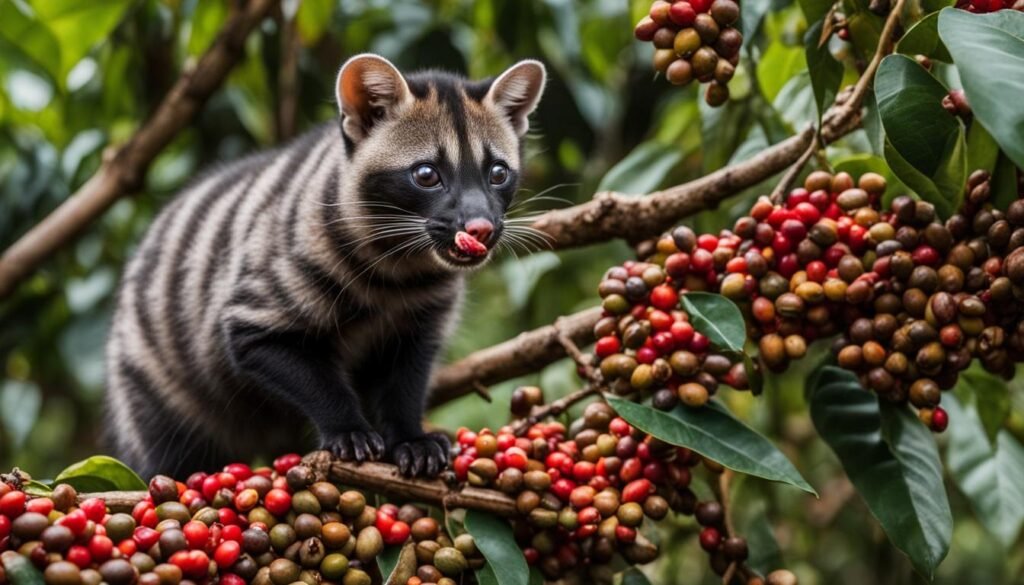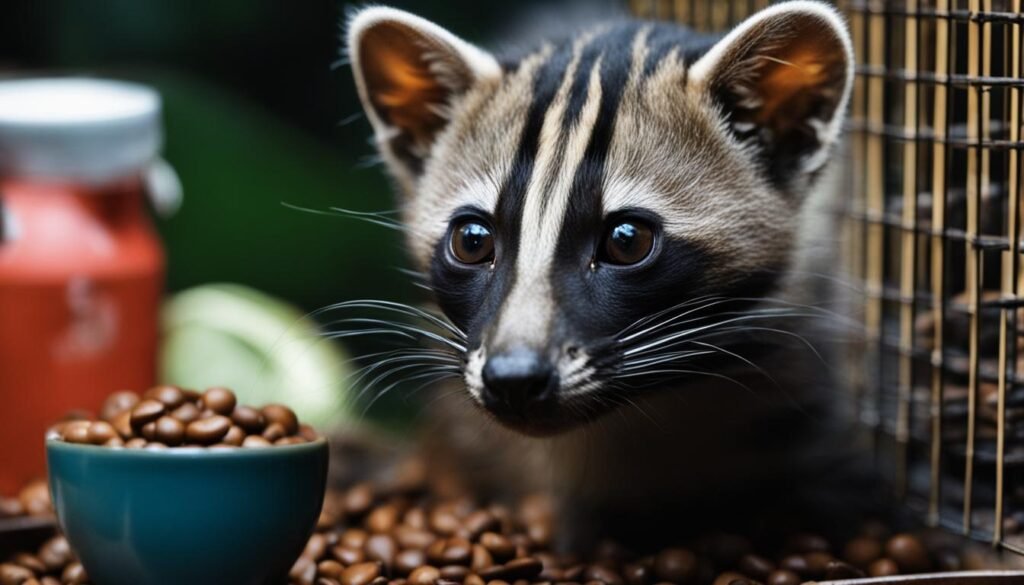Greetings! Today, we delve into the intriguing world of unusual coffee blends and answer the burning question – what coffee is made from cat poop? Yes, you read that correctly! There is a unique and controversial coffee known as cat poop coffee, or more formally, civet coffee.
Civet coffee, scientifically known as kopi luwak, originates from Indonesia and is made from coffee beans that have been excreted by the Asian palm civet. These small mammalian creatures have a discerning taste for the ripest coffee cherries, which they consume and eventually pass through their digestive tracts. The enzymes in their digestive systems alter the chemical composition and taste of the coffee beans, resulting in a one-of-a-kind flavor profile.
Key Takeaways:
- Kopi luwak, also known as cat poop coffee or civet coffee, is a unique Indonesian coffee made from coffee beans that have been excreted by the Asian palm civet.
- The digestion process in the civet’s digestive tract alters the chemical composition and taste of the coffee beans, resulting in a distinct flavor profile.
- Kopi luwak is considered one of the most expensive coffees in the world due to its rare production method and limited supply.
- There are concerns surrounding the treatment of civets and issues of authenticity and fraud in the industry.
- Despite the controversies, kopi luwak continues to captivate coffee enthusiasts around the world.
What Is Kopi Luwak?
Kopi luwak is a type of Indonesian coffee that has gained global popularity for its unique production method and distinctive flavor profile. It is often referred to as “cat poop coffee” due to its unusual origins. This coffee is made from coffee beans that have been excreted by the Asian palm civet, also known as the civet cat. The civet cats are fed with only the ripest coffee cherries, resulting in a high-quality coffee with a complex taste.
During the digestion process in the civet’s digestive tract, enzymes alter the chemical composition and taste of the coffee beans. This gives kopi luwak its distinct flavor, characterized by its smoothness, low acidity, and rich earthy undertones. Despite its peculiar name, it’s important to note that civet cats are not actually cats. They belong to a different biological family.
The Origin of Kopi Luwak
Kopi luwak has its origins in Indonesia, where it is traditionally produced. The term “kopi” means coffee in the Bahasa Indonesian language, and “luwak” is the local name for the Asian palm civet. The coffee industry in Indonesia recognizes kopi luwak as a unique and sought-after product, appreciated for its rarity and distinct flavor that cannot be replicated through conventional coffee processing methods.
Over time, kopi luwak has gained popularity beyond Indonesia and has spread to other countries in Southeast Asia with similar ecosystems and climates. Today, it is considered one of the most expensive coffees in the world due to its limited supply and the intensive production process involved.
Kopi luwak is a coffee that sparks curiosity and intrigue among coffee enthusiasts, offering a taste experience like no other. While it may have a controversial name and production method, its unique qualities continue to captivate the attention of those seeking an extraordinary coffee experience.
What Makes Kopi Luwak Special?

Kopi luwak, also known as civet coffee, stands out from other coffees due to its unique production method and resulting flavor profile. The process begins with the Asian palm civet, a small mammal native to Southeast Asia. These civets selectively consume only the ripest coffee cherries, which are then digested in their digestive tracts. During digestion, enzymes in the civet’s digestive system alter the chemical composition of the coffee beans.
This unique digestion process leads to a transformation in the taste of the coffee beans. The enzymes break down proteins that typically contribute to bitterness in coffee, resulting in a smoother and less acidic cup of kopi luwak. The flavor profile of kopi luwak can vary depending on factors such as the civet cat’s diet and the type of coffee bean they consume. Common flavor notes associated with kopi luwak include rich earthy tones, citrus, chocolate, and floral undertones.
What truly sets kopi luwak apart is the meticulousness of the production process. Civets are fed only the finest coffee cherries, and the collection of the coffee beans from their droppings is a labor-intensive task. Additionally, the limited supply and high demand contribute to its reputation as one of the most expensive coffees in the world. While controversies surrounding the treatment of civets have marred the industry, efforts are being made to promote ethical practices in the production of kopi luwak.
How Is Kopi Luwak Made?

The production process of kopi luwak involves several steps that contribute to its unique flavor and rarity. Let’s take a closer look at how this fascinating coffee is made.
The Selection of Coffee Cherries:
To begin the process, native farmers carefully grow and cultivate coffee plants. They pay close attention to the ripening of coffee cherries, selecting only the ripest and highest quality ones for the next step.
The Digestion Process:
Once the farmers have collected the ripe coffee cherries, they are then fed to the civet cats. In the civet’s digestive system, the beans go through an enzymatic digestion process over the course of 24 to 36 hours. It’s during this process that the chemical composition and taste of the coffee beans are altered, resulting in the distinct flavor profile of kopi luwak.
Coffee Bean Extraction and Processing:
After the digestion process, the civet poops, and the coffee beans are carefully handpicked from the feces. These beans then undergo processing, which includes washing, drying, and roasting. This process ensures that the coffee beans are safe for consumption and enhances their flavor. The beans are then packaged and sold as kopi luwak coffee, ready to be enjoyed by coffee enthusiasts around the world.
Why Is Kopi Luwak Expensive?

Kopi luwak, also known as cat poop coffee, has earned a reputation as one of the most expensive coffees in the world. But what exactly makes it so pricey? The answer lies in a combination of high demand, limited supply, and an intensive production process.
First and foremost, kopi luwak is a coffee that is in high demand. Coffee enthusiasts from around the world are intrigued by its unique flavor profile and the intriguing story behind its production. As a result, there is a significant market for kopi luwak, which drives up its price.
However, the supply of kopi luwak is extremely limited. Only around 50 tons of kopi luwak are produced each year, compared to the millions of tons of regular coffee. This scarcity further contributes to its high price.
Additionally, the production process of kopi luwak is labor-intensive and time-consuming. Civets, the animals responsible for digesting and excreting the coffee beans, are selective about the coffee cherries they eat. After the digestion process, the coffee beans are handpicked from the feces, processed, and roasted. This meticulous process adds to the cost of producing kopi luwak.
Summary
In summary, kopi luwak is expensive due to its high demand, limited supply, and the intensive production process involved. Coffee lovers who are willing to indulge in this unique experience are willing to pay a premium for the rarity and labor that goes into producing this extraordinary coffee.
Controversies Surrounding Kopi Luwak

The production of kopi luwak, also known as cat poop coffee, has been shrouded in controversies, particularly concerning animal welfare and ethical concerns. One of the main controversies surrounding kopi luwak is the caged production of civets. Many civets used in the production process are kept in small cages and force-fed coffee cherries, leading to concerns about their well-being and treatment.
Animal welfare advocates argue that these captive civets endure poor living conditions and suffer from a high mortality rate. The practice of keeping civets in cages for kopi luwak production has raised ethical concerns among consumers and industry experts alike. The conditions in which the civets are kept, such as confined spaces and inadequate diets, go against the principles of ethical animal treatment.
Furthermore, the farming and capture of civets for kopi luwak production may also pose a threat to the wild civet population. As demand for kopi luwak continues to rise, there is a risk of overexploitation and depletion of the civet population in their natural habitats. Efforts are being made to address these controversies and promote more ethical practices in the production of kopi luwak.
Protecting Animal Welfare
Concerned consumers and organizations are advocating for greater transparency and accountability in the kopi luwak industry. They encourage consumers to support ethical producers who prioritize the well-being of civets. By choosing kopi luwak from verified and sustainable sources, consumers can play a role in promoting animal welfare and responsible production practices.
Education and awareness are key to addressing the controversies surrounding kopi luwak. By understanding the ethical concerns associated with the coffee and making informed choices, consumers can contribute to positive change in the industry. It is important for the kopi luwak industry to prioritize the welfare of civets and work towards sustainable and ethical production methods.
Conclusion
So there you have it, a summary of the fascinating world of kopi luwak, also known as “cat poop coffee.” This unique and expensive coffee is made from coffee beans that have been excreted by the Asian palm civet, resulting in a distinct flavor profile and smoothness that captivates coffee enthusiasts.
However, it’s important to be aware of the controversies surrounding kopi luwak. The production process has raised concerns about animal welfare, with many civets being kept in cages and force-fed coffee cherries. This treatment of civets and the impact on their well-being is an ethical concern that should not be overlooked.
As consumers, we have the power to support ethical producers who prioritize the well-being of civets. By choosing kopi luwak from reputable sources and advocating for sustainable and responsible practices, we can contribute to a more ethical coffee industry.
In conclusion, while kopi luwak remains a fascinating and intriguing coffee, it’s essential to consider both its unique qualities and the ethical concerns surrounding its production. As we explore the world of coffee, let’s continue to prioritize the well-being of animals and make conscious choices that align with our values.
FAQ
What coffee is made from cat poop?
Kopi luwak, also known as cat poop coffee, is made from coffee beans that have been excreted by the Asian palm civet.
What is kopi luwak?
Kopi luwak is a type of Indonesian coffee made from coffee beans that have been excreted by the Asian palm civet, also known as the civet cat.
What makes kopi luwak special?
Kopi luwak is special because the digestion process in the civet’s digestive tract alters the chemical composition and taste of the coffee beans, resulting in a unique flavor profile.
How is kopi luwak made?
Kopi luwak is made through a process where coffee cherries are fed to civet cats, and the beans in the cherries go through an enzymatic digestion process in the civet’s digestive system. After digestion, the beans are collected from the feces, processed, and roasted before being sold as kopi luwak coffee.
Why is kopi luwak expensive?
Kopi luwak is expensive due to its high demand and limited supply. The production process is also labor-intensive and time-consuming, contributing to the high price.
What are the controversies surrounding kopi luwak?
The controversies surrounding kopi luwak include concerns about animal welfare, as many civets used in production are kept in cages and force-fed coffee cherries.
What is the summary of kopi luwak?
Kopi luwak, also known as cat poop coffee, is a unique and expensive coffee made from coffee beans that have been excreted by the Asian palm civet. While it has a distinct flavor profile, it is important to consider the controversies surrounding its production and support ethical practices.

Leave a Reply